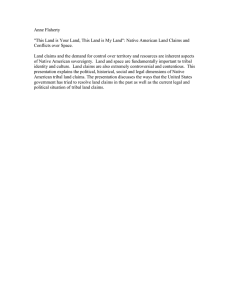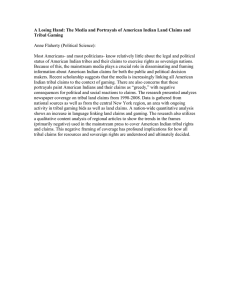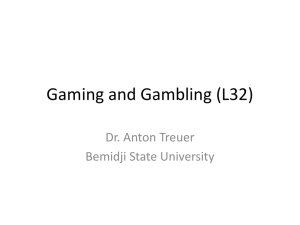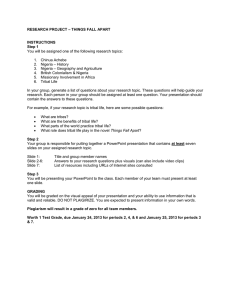– Tribal Gaming: Casino Marketing and Tribal Public Relations HTM 373
advertisement
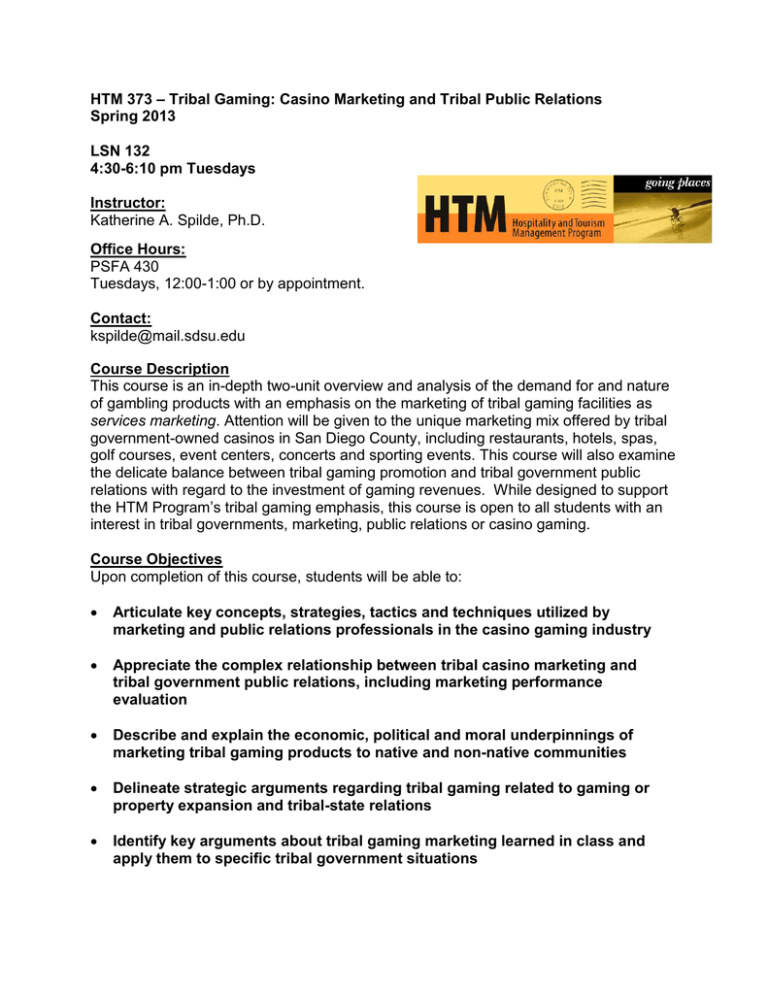
HTM 373 – Tribal Gaming: Casino Marketing and Tribal Public Relations Spring 2013 LSN 132 4:30-6:10 pm Tuesdays Instructor: Katherine A. Spilde, Ph.D. Office Hours: PSFA 430 Tuesdays, 12:00-1:00 or by appointment. Contact: kspilde@mail.sdsu.edu Course Description This course is an in-depth two-unit overview and analysis of the demand for and nature of gambling products with an emphasis on the marketing of tribal gaming facilities as services marketing. Attention will be given to the unique marketing mix offered by tribal government-owned casinos in San Diego County, including restaurants, hotels, spas, golf courses, event centers, concerts and sporting events. This course will also examine the delicate balance between tribal gaming promotion and tribal government public relations with regard to the investment of gaming revenues. While designed to support the HTM Program’s tribal gaming emphasis, this course is open to all students with an interest in tribal governments, marketing, public relations or casino gaming. Course Objectives Upon completion of this course, students will be able to: Articulate key concepts, strategies, tactics and techniques utilized by marketing and public relations professionals in the casino gaming industry Appreciate the complex relationship between tribal casino marketing and tribal government public relations, including marketing performance evaluation Describe and explain the economic, political and moral underpinnings of marketing tribal gaming products to native and non-native communities Delineate strategic arguments regarding tribal gaming related to gaming or property expansion and tribal-state relations Identify key arguments about tribal gaming marketing learned in class and apply them to specific tribal government situations Competencies HTM 373 provides students the opportunities to develop the following competencies of the HTM Kaleidoscope Competency Model: Business Savvy Planning Creative Decision Making People Savvy Interpersonal Communication Networking Self Savvy Professionalism Self Development Resources There is no required textbook. Cases and other materials must be read as assigned. Other resources (including course articles) will be posted on Blackboard and/or handed out in class. It is expected that the material will be read prior to the class period so topics can be incorporated in the class discussions and activities. Blackboard The Professor will communicate with students using Blackboard whenever possible. All students should get a Blackboard account and visit the HTM 373 course site regularly. Structure and Assessment This course will utilize a mix of lectures, guest speakers and a online assignments and projects. Each week the Professor will introduce and the class will actively discuss a new topic related to tribal gaming marketing and public relations. During the first few weeks, we will examine both the character of and demand for gambling products in detail, including ways that demand is understood and measured. The middle of the course will have students participating in (and leading) discussions of specific marketing and public relations situations and evaluating assumptions related to the marketing of casino entertainment, including restaurants, concerts and hotels. Toward the end of the course the class will visit with industry professionals both in class and at a local casino property. Finally, each student will prepare an original research paper and present a summary to the class via a Powerpoint presentation. Grading In order to acknowledge achievements and monitor progress, HTM needs a realistic and meaningful system for grading performance. The professional community also expects HTM to maintain standards that reflect its reputation as one of the foremost programs of its type in the country. Tribal governments and casino operators also require a level of applied knowledge that will facilitate success in the tribal gaming industry. According to the University's Graduate Bulletin, A means outstanding achievement; available for only the highest accomplishment; B means praiseworthy performance; definitely above average; C means average; awarded for satisfactory performance. In general, professors in HTM award "A" grades to acknowledge achievements that go beyond specified course requirements and criteria. By its very nature, this type of performance cannot always be spelled out clearly in advance. "A"s are reserved for special efforts that exceed expectations by demonstrating exceptional creativity, boldness, commitment, ingenuity, or elegance. University Senate policy and State law implicitly require the use of norm-referenced grades at SDSU. However, the Professor does not grade on a curve within individual courses or semesters, believing that tribal gaming classes are too small to be used for curve-based grading. Also, many of the techniques and approaches presented in HTM 373 emphasize criterion-based evaluation rather than norm-referenced evaluation schemes. Grading Factors Assignment/Activity Responsibility Online Assignments Individual % of final grade 5 X 10= 50 Final Research Presentation (Powerpoint presentation of Team strategy recommendations) 30 Overall Course Participation. Reflects the Professor's subjective assessment of the quality and quantity of your interactions with other class members and the Professor, the care you take in using class time, and the way you contribute to the course's learning climate, including attendance. 20 TOTAL Individual 100 Reported Grades 94 and above 93-90 89-87 86-84 83-80 A AB+ B B- 79-77 76-74 73-70 69-60 Below 60 C+ C CD F Optional Industry Experiences You will have opportunities throughout the semester to get involved in the tribal gaming industry by attending events or interacting with tribal people and tribal gaming representatives. Tribal government officials and casino executives are solidly behind the HTM tribal gaming emphasis. Students are encouraged to make contacts early, learn about the tremendous array of opportunities in Indian Country and engage themselves in practical experiences to complement the classroom experiences. Academic Integrity Faculty and staff demand the highest levels of academic and professional integrity in all work at San Diego State University and especially in the HTM program. Positive scholarship cannot exist without integrity and your actions determine your level of integrity. Plagiarism, cheating on exams or any other type of academic dishonesty will be referred directly to the Office of Student Rights and Responsibilities for disciplinary action. Professional Requirements To receive full credit for assignments, they must be submitted on time in a complete and error-free fashion. All assignments must be typed, conform to 1” margins, in 12-point font, and double-spaced. All assignments are due at the beginning of class on the due date specified in the attached course outline. The Professor will be available to discuss your paper and presentation with your team before it is due. Please use the Professor as a “sounding board” for your ideas and outlines and, as time allows, to read rough drafts and make suggestions. All papers and presentations will be graded based on content (how deeply you have thought about the topic, integration of your experiences with course concepts, communication of insights, accuracy of concept application, etc.) and presentation (organization, grammar, spelling, style, etc.). Remember, you will be evaluated on both what you say and how you say it, including how well you support your positions or opinions with sources and examples. Accommodations for Students with Disabilities If you are a student with a disability and believe you will need accommodations for this class, it is your responsibility to contact Student Disability Services at (619) 594-6473. To avoid any delay in the receipt of your accommodations, you should contact Student Disability Services as soon as possible. Please note that accommodations are not retroactive, and that I cannot provide accommodations based upon disability until I have received an accommodation letter from Student Disability Services. Your cooperation is appreciated. Remember, HTM is all about exceeding expectations!
